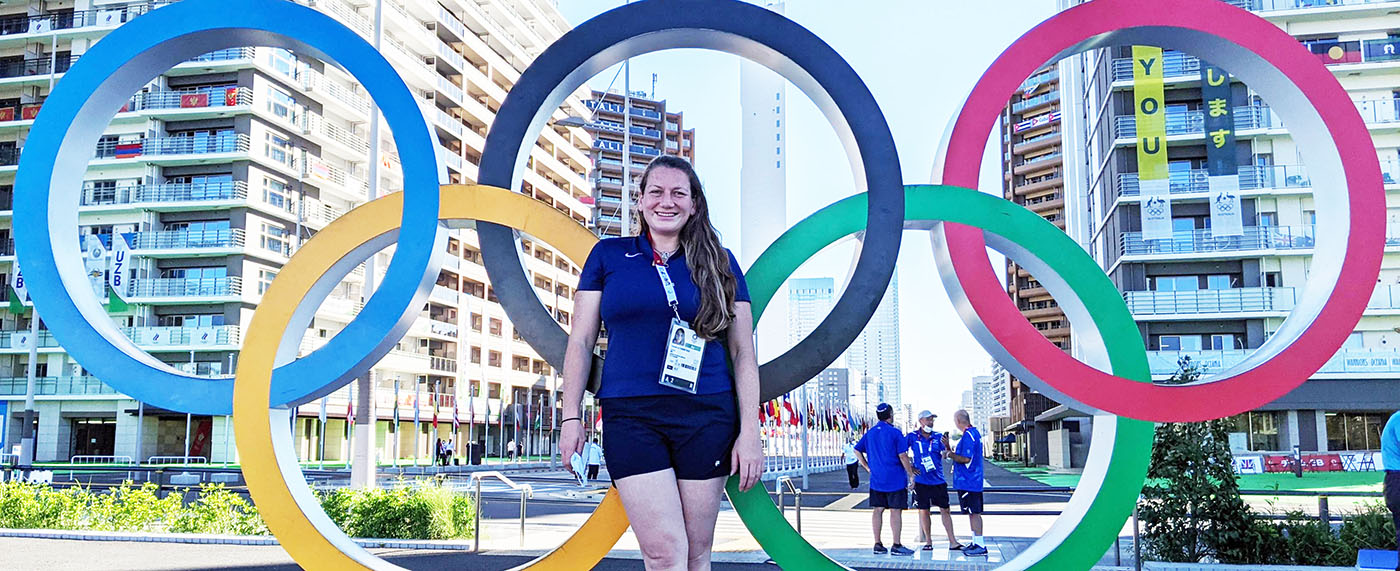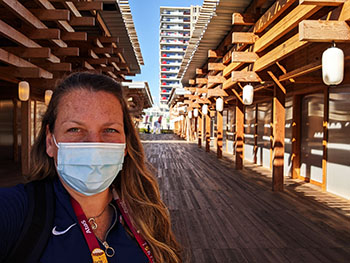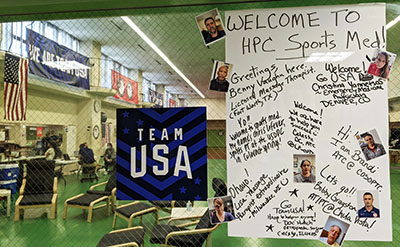
CU at the Tokyo Olympics
Former judo Olympian Christina Yannetsos selected as team physician
Interviewed by Greg Glasgow (October 2021) After a year of waiting, Christina Yannetsos, MD, finally made it to the Summer Olympics in Tokyo.
(October 2021) After a year of waiting, Christina Yannetsos, MD, finally made it to the Summer Olympics in Tokyo.
Yannetsos, an assistant professor of emergency medicine at the University of Colorado School of Medicine, was selected in fall 2019 as a physician for Team USA, but the 2020 Summer Olympics were postponed for a year due to the COVID-19 pandemic. The games took place July 23¬ to August 8, 2021, in Tokyo.
A former member of the USA Judo National team, Yannetsos worked as a physician with the current USA Judo team at the U.S. Olympic and Paralympic Training Center in Colorado Springs before being selected as a physician for the summer games. This was her second trip to the Olympics — she traveled to the Summer Olympics in Athens in 2004 with Team USA Judo, but attended as an alternate and training partner due to a shoulder injury she suffered during Olympic trials.
In this interview, Yannetsos talks about her journey to the Olympics and how her experiences in athletics influenced her career in medicine.
Q: What is the process like to be selected as a physician for Team USA?
A: You start off by working with a national governing body like USA Judo, USA Wrestling, or USA Boxing. You build rapport with the team, and then at that point you can be invited to volunteer at an Olympic training center. I got to volunteer in Colorado Springs, where I had lived as an athlete. I did a rotation there. I volunteered in the sports medicine training room and worked with all the Team USA athletes who live there. I worked with different camps and helped run events. It’s like an on-the-job interview where they see how you work with the teams, how you interact with different specialties, whether it’s trainers, therapists, chiropractors, sport therapists, nutritionists, or psychologists. They see how you form and become part of that team. From there, it’s a selection process. They only take 10 physicians for these Olympics, and they choose from the pool of people who have volunteered and put in their time.
Q: How was the Olympic experience?
A: It went great. It was an amazing experience. It was obviously different than a typical Olympics. We had COVID protocols, we were tested daily, we maintained masking and social distancing, and we stayed within the Olympic bubble. We could only travel within Olympic destinations, whether it was a hotel or venue or hospital or clinic. Those were the places we were preapproved to go, to help keep our athletes safe.
Q: What were your days like in Tokyo?
A: My days were getting up, going to clinic, working with a great group of physical therapists, athletic trainers, mental health professionals, exercise physiologists, chiropractors, and massage therapists for athlete health and recovery. We brought our chefs, and we had all of our nutritionists there so athletes could have nutritional support. They were long days, but really rewarding. We got to watch events from the clinic, and I was able to cover Team USA Judo’s events. It was very rewarding to go and watch our team compete. On my day off, I got to go support our athletes. If you watched the Olympics, you saw that the stands were empty because they didn’t allow spectators. Our support staff, when they had time off, tried to go to support and cheer on our athletes. I went to support volleyball and wrestling, and I watched them win gold and bronze medals. It was really rewarding for them to see the fruits of their labor. Q: How long has judo been a part of your life?
Q: How long has judo been a part of your life?
A: I started judo when I was 5. My best friend at the time was Argentinian. Her dad had participated in judo in Argentina, and my dad did it in college. I was terrible when I started. I got thrown around by the bigger kids, but I was one of those kids where if you put me down, it just made me want to work harder to be better. So I kept going, and I landed on my first international team at 12 or 13. I started traveling internationally with Team USA as a junior athlete, and after high school I moved to Colorado Springs and trained at the Olympic training center out here, then I qualified for the Olympics. I received a scholarship to go to the University of Colorado Colorado Springs, so my education was supported, and they supported me in other things outside athletics as well. They encourage athletes to volunteer and work so they have well-rounded athletes.
Q: What do you like most about judo?
A: It’s an individual sport, so you’re always pushing yourself to be better and you’re always reevaluating yourself to see how you can improve. The thing I like about individual sports is that you really can be introspective and evaluate yourself to see the things you need improvement on and the things you’re doing really well on. I think it’s crossed over to other things in my life. I’m always looking to see how I can do better, how I can improve, and I think a lot of that has to do with judo. Especially the discipline and working hard toward something. A lot of that I owe to judo.
Q: What made you decide to go to medical school?
A: As an athlete, going through injuries and recovery, it was something I really wanted to help others get through as well. I went to the Medical College of Wisconsin for medical school, and I was drawn to emergency medicine because I really enjoy working with patients from all walks of life, different cultures, different backgrounds, different ages, and the ability to connect with people on one of their very worst days and be that supportive advocate. Emergency medicine is another thing that is very challenging. It’s kind of like a puzzle, and you have to put things together pretty quickly.